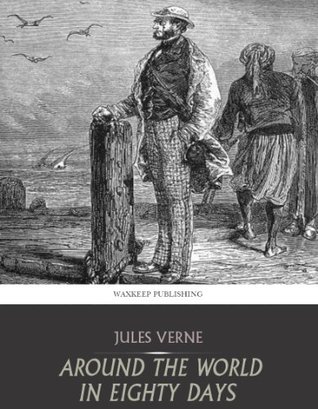More on this book
Community
Kindle Notes & Highlights
Mr. Phileas Fogg lived, in 1872, at No. 7, Saville Row, Burlington Gardens, the house in which Sheridan died in 1814.
Charles van Buren and 4 other people liked this
an enigmatical personage, about whom little was known, except that he was a polished man of the world. People said that he resembled Byron—at least that his head was Byronic; but he was a bearded, tranquil Byron, who might live on a thousand years without growing old.
Noor and 4 other people liked this
He belonged, in fact, to none of the numerous societies which swarm in the English capital, from the Harmonic to that of the Entomologists, founded mainly for the purpose of abolishing pernicious insects.
Akrabar and 7 other people liked this
those who knew him best could not imagine how he had made his fortune, and Mr. Fogg was the last person to whom to apply for the information.
Luís and 5 other people liked this
club decanters, of a lost mould, contained his sherry, his port, and his cinnamon-spiced claret; while his beverages were refreshingly cooled with ice, brought at great cost from the American lakes.
Charles van Buren and 1 other person liked this
If to live in this style is to be eccentric, it must be confessed that there is something good in eccentricity.
Mark and 2 other people liked this
hearing that Monsieur Phileas Fogg was the most exact and settled gentleman in the United Kingdom, I have come to monsieur in the hope of living with him a tranquil life, and forgetting even the name of Passepartout.”
Charles van Buren and 1 other person liked this
“I’ve seen people at Madame Tussaud’s as lively as my new master!”
Luís and 1 other person liked this
His countenance possessed in the highest degree what physiognomists call “repose in action,” a quality of those who act rather than talk.
Luís and 1 other person liked this
Phileas Fogg was, indeed, exactitude personified, and this was betrayed even in the expression of his very hands and feet;
Yorgos and 1 other person liked this
But I would wager four thousand pounds that such a journey, made under these conditions, is impossible.” “Quite possible, on the contrary,” returned Mr. Fogg. “Well, make it, then!” “The journey round the world in eighty days?” “Yes.” “I should like nothing better.”
Yorgos and 1 other person liked this
Everybody knows that England is the world of betting men, who are of a higher class than mere gamblers; to bet is in the English temperament.
Yorgos and 1 other person liked this
“great robbers always resemble honest folks. Fellows who have rascally faces have only one course to take, and that is to remain honest; otherwise they would be arrested off-hand.
Luís and 1 other person liked this
Passports are only good for annoying honest folks, and aiding in the flight of rogues.
Luís and 1 other person liked this
Fix observed, or rather devoured, the stranger with his eyes from a corner of the room.
Luís and 1 other person liked this
never once thinking of inspecting the town, being one of those Englishmen who are wont to see foreign countries through the eyes of their domestics.
Tim Robinson and 1 other person liked this
“I see that it is by no means useless to travel, if a man wants to see something new.
Charles van Buren and 3 other people liked this
This railway does not run in a direct line across India. The distance between Bombay and Calcutta, as the bird flies, is only from one thousand to eleven hundred miles; but the deflections of the road increase this distance by more than a third.
Bernardo and 1 other person liked this
The passengers of the Mongolia went ashore at half-past four p.m.; at exactly eight the train would start for Calcutta.
Luís and 1 other person liked this
remember this: cats were formerly considered, in India, as sacred animals. That was a good time.” “For the cats, my lord?” “Perhaps for the travellers as well!”
Bernardo and 4 other people liked this
It happened to be the day of a Parsee festival. These descendants of the sect of Zoroaster—the most thrifty, civilised, intelligent, and austere of the East Indians, among whom are counted the richest native merchants of Bombay—were celebrating a sort of religious carnival, with processions and shows, in the midst of which Indian dancing-girls, clothed in rose-coloured gauze, looped up with gold and silver, danced airily, but with perfect modesty, to the sound of viols and the clanging of tambourines.
Yorgos and 1 other person liked this
The locomotive, guided by an English engineer and fed with English coal, threw out its smoke upon cotton, coffee, nutmeg, clove, and pepper plantations, while the steam curled in spirals around groups of palm-trees, in the midst of which were seen picturesque bungalows, viharis (sort of abandoned monasteries), and marvellous temples enriched by the exhaustless ornamentation of Indian architecture.
Luís liked this
Feringhea, the Thuggee chief, king of the stranglers, held his sway. These ruffians, united by a secret bond, strangled victims of every age in honour of the goddess Death, without ever shedding blood; there was a period when this part of the country could scarcely be travelled over without corpses being found in every direction.
Luís liked this


